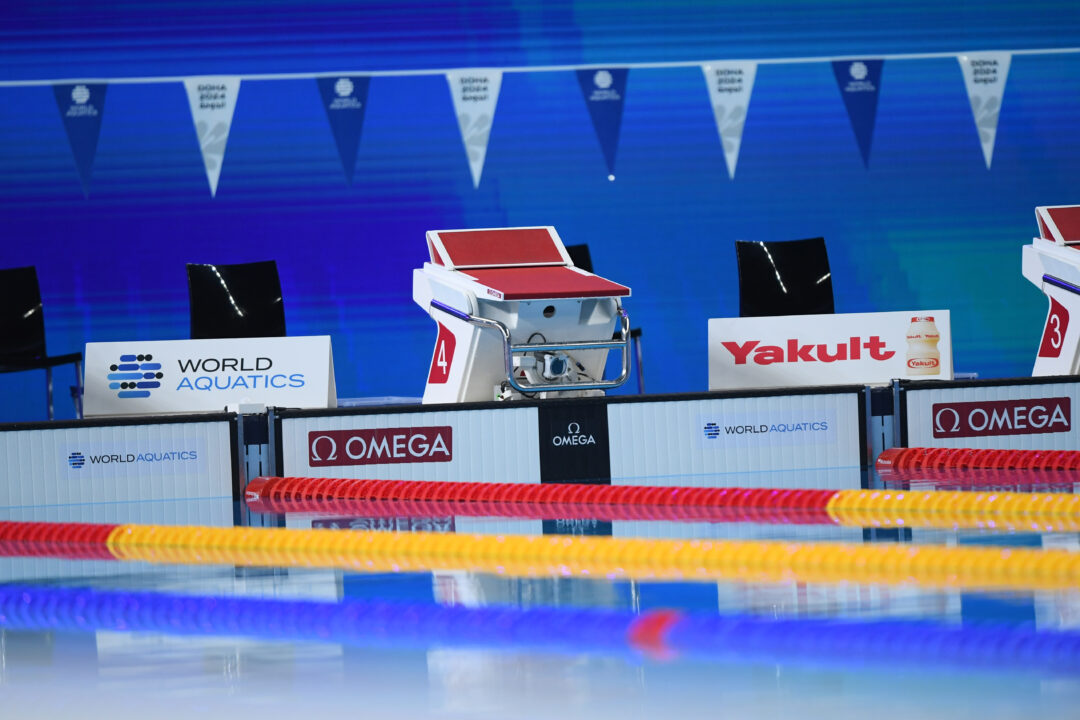World Aquatics is reviewing a policy for the participation of athletes from nations involved in global conflict. The policy was introduced “in response to the various wars, hostilities and other conflicts worldwide [termed “conflict” in the proposal] with the objectives of ensuring the integrity and security of sporting competitions and the overall respect for Athletes, World Aquatics and Olympic principles and values.”
The proposed policy affects any athlete from a “nation in conflict”—which is determined solely by the World Aquatics Executive—who wishes to participate in any World Aquatics event. Along with athletes, support personnel, event hosts and organizers are also subject to the criteria laid out in the proposal, which places a ban on holding events in states determined to be “nations in conflict.”
The document does not appear to distinguish between aggressor or otherwise in its definition of a nation in conflict.
The proposal cites the World Aquatics Constitution clauses 8.8 and 17.1 as two clauses that provide the basis for the organization’s ability to create the policy. While 17.1 is a 26-point clause that outlines the rights and duties of the World Aquatics Bureau, clause 8.8 of the Constitution reads:
“In cases of acts of terrorism, riots, civil unrest, strike, nuclear or chemical contamination, epidemic and other similar circumstances as well as in the event of involvement of a Member’s government in a war or other similar situations, the Bureau shall have the power to take appropriate measures, aiming at preserving the safe, peaceful and regular conduct of World Aquatics competitions and events. The measure may include the suspension or expulsion of a Member, other sanctions as well as appropriate protective measures.”
The proposed policy closely reflects the regulations already in place for Russian and Belarusian athletes, who World Aquatics, then called FINA, banned in March 2022, allowing World Aquatics to expand the existing regulations to nations involved in other conflicts worldwide.
Athletes and Support Personnel
Subject to the policy, athletes and their support personnel may only participate in World Aquatics events if they do not have a “direct contractual relationship with any national security agencies or military associated with any government of a nation in conflict” and have not expressed support for any conflicts verbally, non-verbally, or in writing. The clause lists “in particular public statements, including those made in social media, participation in pro-conflict or pro-war demonstrations or events, and the wearing of any symbol in support for any types of political conflicts or war” as showing support for a conflict.
These athletes and their support personnel may submit applications for neutral athlete status and “shall only be entitled to participate in an Event after review and confirmation by the AQUI” which is the Aquatics Integrity Unit. Athletes must also have achieved any qualifying time necessary to attend the event outside the border of any nation involved in a conflict.
The policy also states that any athlete from a nation in conflict will not be allowed to participate in water polo events, which “intrinsically involves inter alia physical contact between athletes.”
Flags, Anthems, and Uniforms
The proposed policy would not allow the flags of any nations engaged in conflict to be raised or displayed at the competition or any location under the event’s purview. The World Aquatics flag would be used during medal ceremonies or other situations where a flag is necessary.
Similarly, the anthem of any nation declared as a “nation in conflict” by the World Aquatics Executive would be banned and replaced with the World Aquatics anthem.
This question was raised in advance of the 2024 Olympic and Paralympic Games as fans wondered what would happen when neutral athletes made the podium. While this did not occur at the Olympics, it happened multiple times at the Paralympic Games. The Neutral Athletes also did not appear on the medal table on the Paris 2024 website.
Athletes from “nations in conflict” approved to compete as neutral athletes would also need to wear uniforms in “a single plain colour and shall be submitted to World Aquatics for prior approval.” Athletes would be banned from displaying any distinctive national symbol at any World Aquatics event.
Media Interactions and Personnel
The policy would ban neutral athletes and support personnel from going through mixed zones, participating in press conferences, or giving any interview during a World Aquatics event.
No government or state officials from a nation in conflict would receive accreditation for a World Aquatics event and no technical officials from the country would be appointed.

So a swimmer from a nation under terrorist attack may be expeled for his/her “protection”?
How about a female swimmer who had been harassed? Might as well go ahead and expel her as well, for her “protection”.
And here we were being told that sports bring people together and that sport and politics don’t mix.
Seems WA is overshooting for a presumtious role that it is far from being qualified to undertake. And with a very loosely worded “policy”.
Who appointed them, and what ever qualified them to eliminate athletes nations and flags?
“Nation in conflict” needs to be clearly defined otherwise this policy will inevitably target certain nations while others are given a free pass.
1. Idealy that may be true
2. But who elected the World Aquatics bureau for that role? Its really far out of their scope.
With this set of guidelines, I wonder how World Aquatics (née FINA) would handled the US invasion of Iraq in 2003.
Imagine NBC’s 2004 Olympics ratings with Phelps wearing the uniform of a neutral athlete.
Exactly.